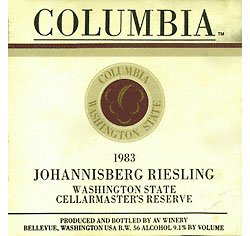Last spring, one edition of this column was devoted to celebrating a notable Northwest wine success story: the 21-year run of Columbia Winery’s Cellarmaster’s Riesling, an inexpensive off-dry wine which accounts for half of Columbia’s national sales. Following the article, Columbia winemaker David Lake kindly sent us a bottle of the very first vintage of Cellarmaster’s, noting that after 21 years he couldn’t vouch for the condition of the contents, but that, even if over the hill, it might be at least of historical drinking interest.
Indeed. Riesling is, perhaps more than any other grape, notoriously age-worthy. German producers scouting their cellars for something for a special occasion have been known to find bottles from the 1930s that are still fresh enough to drink. Most of those wines, however, were not made in the dry or off-dry mode but in the hypersweet Beerenauslese and Trockenbeerenauslese style. “Interesting” or not, a 21-year-old wine made for immediate drinking at a price point in the $1.99 neighborhood was not an obvious candidate for exceptional improvement with age.
When we finally got round to opening Lake’s gift last week, the odds against the wine rapidly lengthened. Before the corkscrew was a third of the way in, the cork crumbled into rotten, rice-grain-size bits. The remainder of the cork, though we managed with delicate handling to extract it in one piece, was squashy and discolored clear through—not a good omen.
The first splash of wine into the glass looked promising: concentrated to a deep gold in color but without any brown overtones indicating that oxygen had leaked into the bottle. Even then, I took my first sniff with trepidation. A fine, almost piercing bouquet of fruit aromas, seemingly nested one within the other, expanded inside my head, notable among them grape, strawberry, peach, and apricot. Just as notably absent were the banana and caramel tangs that indicate a wine is slithering toward senescence. This wine was certainly mature, but it was a maturity glowing with health and energy. Even those sippers who don’t generally care for off-dry wines gloried in its flavor. Even people who don’t generally care for riesling were seduced.
The most recent issue of Wine Spectator devoted a good many pages to a beginner’s guide to building a wine cellar. The authors calculated that a starter kit (wines only, not including any hardware, racking, machinery, etc.) need not cost a penny more than $8,000. After my revelatory encounter with the 21-year-old Cellarmaster’s Riesling, I had a minor epiphany. What if one could assemble such a cellar for a 10th or less of that amount, simply by finding and buying inexpensive age-worthy wines? Riesling may be an exceptional bargain and exceptionally ageable, but I’ll bet any good wine merchant could direct one to at least half a dozen prospects. The workers’ wine cellar: Now there’s a concept.








